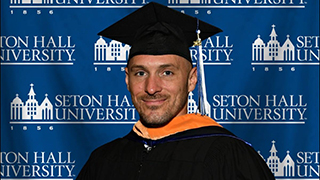MSN to DNP Pathway Prepares Nurse to Lead
Monday, July 21, 2025

Daniel Fawcett, M.S.N. ’25, celebrates his graduation from Seton Hall’s Psychiatric–Mental Health Nurse Practitioner program. He is continuing on the M.S.N.-to-D.N.P. track at Seton Hall.
When Daniel Fawcett enrolled in Seton Hall College of Nursing’s online M.S. in Psychiatric–Mental Health Nurse Practitioner (PMHNP) program, he was looking for more than just convenience — he wanted flexibility, faculty who understood clinical realities and a program grounded in service.
He found all three. Fawcett graduated in May 2025 feeling well prepared to treat patients with complex mental health needs and confident in his ability to lead.
“My experience in the PMHNP program at Seton Hall was exceptional,” he said. “I felt prepared for my certification exam, and the faculty and staff were consistently supportive.”
Flexible Online PMHNP Program Supports Working Nurses
Seton Hall’s 49-credit PMHNP program is delivered in a fully online, asynchronous
format. In-person clinical rotations follow the online courses and are coordinated
with support from the program directors and extensive preceptor network.
This flexible structure proved essential for Fawcett, who balanced graduate school with full-time work and personal responsibilities — including the illness and loss of multiple family members.
"I leaned heavily on what I was learning in the program — becoming, in many ways, my own first patient,” he said. “I stayed motivated by reminding myself of my purpose: to use this degree to make a difference in the lives of others, especially those navigating their own mental health challenges.”
Throughout it all, Fawcett said faculty support was critical. “They invested in my success at every stage.”
ICU Nurse Transitions to Psychiatric–Mental Health NP Role
Before entering the program, Fawcett was a nurse in a cardiothoracic intensive care
unit, caring for patients recovering from major surgeries such as CABG and valve replacements.
While his focus was critical care, he found himself drawn to the emotional dimensions
of nursing.
“Even though I wasn’t in a formal mental health role, those moments made me appreciate how physical and emotional health are connected,” he said. “That experience is part of what drew me to psychiatric–mental health nursing — I saw firsthand how important it is to care for the whole person, not just the diagnosis.”
Clinical Placement Support for PMHNP Students at Seton Hall
After completing coursework, PMHNP students fulfill at least 600 hours of clinical
rotations. At Seton Hall, clinical placement support is a defining strength of the
M.S.N. programs.
“Our nurse practitioner programs are distinguished by our focus on clinical preparedness. Our dedicated program directors help place students in their clinical settings and provide support throughout our students’ graduate experience,” said Kristi Stinson, Ph.D., R.N., A.P.N.-B.C., interim dean of the College of Nursing.
Fawcett’s clinical placement at Newark’s Mary Eliza Mahoney Health Center — which provides primary and behavioral healthcare for underserved populations — reinforced his commitment to serving the community and was a highlight of the program. “I had the opportunity to care for a historically underserved population and apply what I learned in real-world settings,” he said.
PMHNP Graduates Help Fill Mental Health Provider Shortage
Seton Hall’s PMHNP program prepares graduates to diagnose and treat psychiatric conditions
across the lifespan — from adjustment disorders to serious illnesses such as schizophrenia
and bipolar disorder. Graduates are eligible to sit for the PMHNP board certification
exam offered by the American Nurses Credentialing Center (ANCC) or the American Academy
of Nurse Practitioners Certification Board (AANPCB).
The need for psychiatric–mental health nurse practitioners has never been greater. According to the U.S. Department of Health & Human Services, more than 6,200 U.S. communities are designated mental health professional shortage areas.
Fawcett recently passed his board certification exam and is applying for licensure in both New York and New Jersey. He will soon begin practicing in a private psychiatric practice that serves both states.
Online D.N.P. Program Empowers Nurse Practitioners to Lead
After earning his M.S.N., Fawcett chose to continue his education at Seton Hall as
a student in the Doctor of Nursing Practice (D.N.P.) program — a pathway that prepares advanced practice nurses to lead healthcare systems
and improve patient outcomes through clinical innovation and policy advocacy.
“I’m looking forward to expanding my clinical knowledge and leadership skills to better serve my patients,” he said. “The D.N.P. will equip me with the tools and credentials to deliver care at the highest level and advocate effectively within the healthcare system.”
Seton Hall’s supportive learning environment and track record of producing nurse leaders across New Jersey makes the D.N.P. program a natural next step in Fawcett’s graduate education. He said the sense of community and commitment from faculty were major factors in his decision.
He added, “The program aligns with my long-term goals, and after building strong relationships with the faculty and staff, there was no other place I wanted to continue my journey.”
Categories: Education, Health and Medicine






